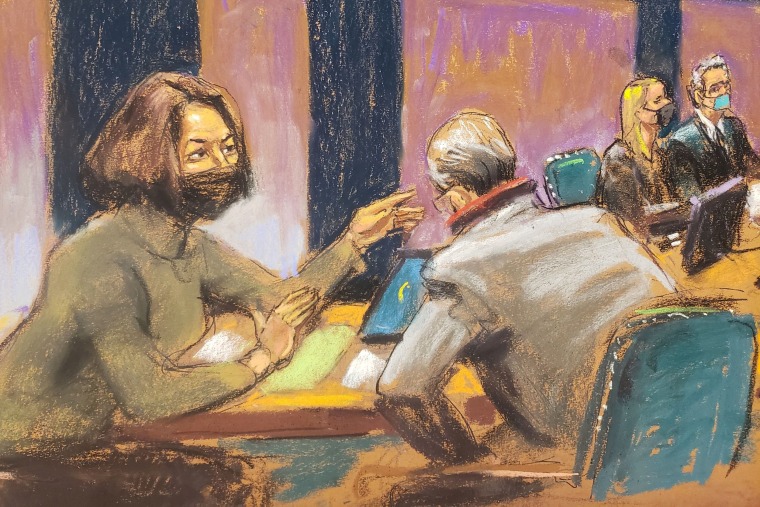The ongoing sex trafficking trial of Ghislane Maxwell this month has included plenty of bombshell details. Allegations against Maxwell and, by association, her former boss Jeffrey Epstein, highlight the glamorous lifestyles of the rich and powerful, where seemingly nothing is out of reach — not even sexually abusing teens.
Regardless of the economic and social status of the predators, their tactics share a common playbook.
As extraordinary as the trial appears, and as horrific as the allegations against Maxwell are, it’s actually a textbook sex trafficking case, reflective of a pervasive and devastating industry that preys on America’s most vulnerable teenagers. Human trafficking, defined as the obtaining of labor or commercial sex through force, fraud or coercion, or any commercial sex involving a minor, is the second-largest criminal industry in the world and among the fastest growing. Regardless of the economic and social status of the predators, their tactics share a common playbook.
(Maxwell has pleaded not guilty to charges including conspiracy and sex trafficking. Epstein died by suicide while awaiting trial on sex trafficking charges.)
The evidence so far suggests that Maxwell was masterful at gaining trust and manipulating insecure teenage girls through gifts, promises, special attention and even a cute pooch. This is a tried and true strategy for virtually every sex trafficker, whether it be over Instagram in the Bay Area or at a Taylor Swift show in Idaho.
Indeed, the alleged actions of Maxwell and Epstein are typical of trafficking and exploitation in the U.S. Far from the kidnappings and dramatic basement dungeons of “Law and Order: SVU,” exploitation can happen in plain sight — with devastating effects. Witnesses like Epstein’s former pilot have described meeting some of the victims, but not realizing anything was amiss.
As Dr. Lisa Roccio, an expert in child sexual abuse who testified during the prosecution’s case, noted last week: “When children are sexually abused, most often it is not done through the use of physical force but rather through grooming and coercion in the context of a relationship.”
Traffickers groom victims by identifying their needs and insecurities. Abusers will purport to fulfill these needs, whether they be financial, emotional or a combination thereof. It could be as simple as providing a place to stay or a ride out of town. For many teenage girls, it is special attention and affection.
During the trial this week, “Kate” testified that the first time she hung out with Maxwell, she felt “special.” She was a lonely 17-year-old who “hadn’t found a group of friends yet.” Maxwell “seemed very exciting,” was “everything I wanted to be” and described Epstein as a philanthropist who “liked to help young people.” This behavior sounds a lot like grooming.
Jane, the first victim who testified anonymously last week, described her first meeting with Maxwell at a summer camp in Michigan. Jane was a 14-year-old aspiring singer from Palm Beach, Florida, and Maxwell and Epstein were the camp’s well-heeled benefactors. Jane says Maxwell approached a group of girls with an irresistible Yorkie in tow and singled out Jane for special attention. Jane had recently lost her father to leukemia and, as she testified last week, her family was struggling financially. Maxwell reeled Jane in. Epstein “coincidentally” had a house in Palm Beach, and began inviting Jane for visits, first with her mom and then alone. Jane says Maxwell took her to the movies, bought her clothing, chatted with her about her social life and seemed to care about Jane’s career aspirations. Maxwell talked about sex and sexual encounters casually, a tactic that can desensitize potential victims.
The defense has focused, predictably, on trying to undermine Jane’s credibility. Why wouldn’t she have reported the abuse at the time? Why did it take so long?
The defense has focused, predictably, on trying to undermine Jane’s credibility. Why wouldn’t she have reported the abuse at the time? Why did it take so long?
But Jane’s descriptions of shame and fear — of living with abuse rather than reporting it — is quite common among survivors of sex trafficking. Survivors face many barriers in reporting abuse. Traffickers condition survivors to believe that the trafficker wields universal power, that the victim will never be believed or taken seriously, that the abuse isn’t really abuse and that it is the victim’s fault. Traffickers seek to cement this conditioning through threats ranging from physical violence and threats against family members, to career or reputational harm, to financial ruin. Jane testified that when she started avoiding Epstein, he insisted that he needed to see her, and reminded her that “she needed to be grateful to him because her mother was living in one of his apartments.”
Jane also testified that Maxwell and Epstein frequently “name-dropped” their circle of powerful public figures: “They were friends with essentially everyone.” Even when traffickers are less connected than a billionaire known to hobnob with royals and presidents, this is a classic tactic. Whether actually true or not, traffickers will create the perception that they know everyone and control every aspect of the victim’s life. The abuser knows the cops, knows the other kids at school, knows local gang members, and is so well connected that escaping the abuse or reporting it to the authorities would be absolutely impossible.
Indeed, predators count on victims not coming forward, both because of the fear and shame that the trafficker has instilled and because of the trauma bond that the abuser has created. But like many alleged predators, Epstein and Maxwell may have underestimated the courage of their victims. The survivors who have come forward in this case not only take the stand to hold Maxwell accountable, but also to expose the manipulative tactics of traffickers everywhere. Hopefully this both validates and encourages other survivors to report abuse and gives young people insight into what to watch out for.

